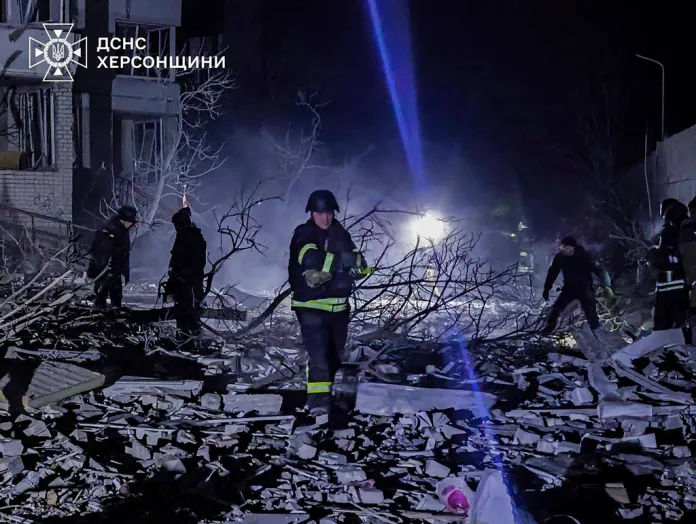A United Nations commission scrutinizing Russia on Monday alleged Moscow committed crimes against humanity through drone warfare and the removal of civilians from occupied areas during the Ukraine war.
The U.N.’s Independent International Commission of Inquiry on Ukraine accused Russia of systematically carrying out drone attacks targeting civilians near the front line that have forced residents to flee Ukrainian-held territory.
The report focused in part on allegations that Russian operators routinely targeted civilians in the oblasts of Kherson, Dnipropetrovsk, and Mykolaiv. It concluded that the attacks were “part of a coordinated policy to drive out civilians from those territories, and amount to the crime against humanity of forcible transfer of population.”
“For over one year, Russian armed forces have been directing drone attacks against an extensive range of civilian targets,” the report said, including people, houses or buildings, humanitarian distribution points, and critical energy infrastructure. The drone attacks were intended to create “a permanent climate of terror” and force residents out of Kherson, according to the New York Times.
Over 200 civilians have been killed in the three oblasts since July 2024, according to the report.
The UN probe was based on interviews with 226 people. It suggested Russia systematically violated internationally accepted rules of war that provide certain protections to civilians, including that parties involved must distinguish between combatants and civilians, harm to civilians must be proportionate to the direct military advantage anticipated, and that reasonable precautions must be taken to minimize damage to civilians.
The commission also focused on accusations that Russia committed war crimes in areas it occupies in the Zaporizhzhia region. Those allegations stem from concern about how Moscow removed civilians from those areas, with the report alleging deporations and transfers at times included “various forms of violence — sometimes including torture.”
The report said a number of civilians were forcibly transferred out of Russian-occupied areas of Zaporizhzhia to territories under Ukrainian control in 2023.
After being accused of “failing to cooperate, carrying out activities considered as destabilizing, or having a pro-Ukrainian position,” the civilians were forced to walk between roughly six to nine miles out of Russian-held territory through an “operational area with landmines and trenches” while hearing “shots and shelling nearby,” the report alleged.

Russia does not recognize the U.N. commission or the International Criminal Court, which defines crimes against humanity as a range of acts — including murder, enslavement, deportation, torture, and rape — that are “committed as part of a widespread or systematic attack directed against any civilian population, with knowledge of the attack.”
The U.S. government, under the Biden administration, similarly accused Russia of committing crimes against humanity.
In 2023, then-Secretary of State Antony Blinken said officials undertook a “careful analysis of the law and available facts” to make that determination. Russia spearheaded the “execution-style killings of Ukrainian men, women, and children; torture of civilians in detention through beatings, electrocution, and mock executions; rape” and the deportation of “hundreds of thousands of Ukrainian civilians to Russia,” he said.
“These acts are not random or spontaneous; they are part of the Kremlin’s widespread and systematic attack against Ukraine’s civilian population,” Blinken added.
EIGHT MOST SHOCKING REVELATIONS FROM THE NORD STREAM SABOTAGE PLOT
Ukraine has also faced scrutiny over deadly drone strikes on civilians in Russia, as well as accusations that it wielded one of the most sweeping acts of sabotage against civilian infrastructure in modern history.
Germany pointed the finger at Ukraine after a mysterious explosion blew up the Nord Stream oil pipelines. Berlin most recently arrested a Ukrainian man in connection with the massive attack on European energy infrastructure, with federal prosecutors saying the suspect worked with a Ukrainian group to plant explosives in Swedish and Danish waters under the Nord Stream 1 and Nord Stream 2 pipelines.
